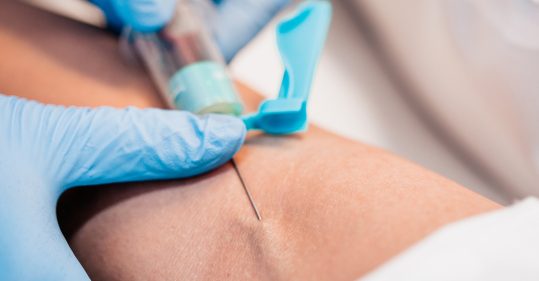Practices must still ration blood tests despite emergency tube order, says NHS England

General practice must continue to ration blood tests, NHS England has said, despite its supplier securing an emergency order of nine million test tubes due to arrive this week.
Since last week, general practice has been under instruction to cancel all blood tests except those that are ‘clinically urgent’ until 17 September, due to a shortage of test tubes that NHS England said was still worsening.
Key supplier of blood test tubes to the NHS Becton Dickinson (BD) – which originally warned of serious supply chain issues in July – yesterday said that it will import nine million additional tubes this week for ‘immediate distribution’ under emergency measures.
But an NHS England spokesperson told Nursing in Practice sister publication Pulse that its previous guidance still stands and that GPs should continue not to offer any blood tests that are not ‘clinically urgent’ until at least 17 September.
Tests that can go ahead include those required for two-week wait referrals, those that are ‘extremely overdue and/or essential for safe prescribing’ or condition monitoring, those that could prevent a hospital admission or onward referral, or those for suspected sepsis or ‘conditions with a risk of death or disability’.
Related Article: Measures to prevent cancer would be cost-effective, suggests economic report
The spokesperson reiterated that NHS England has been working to secure additional stock.
They said: ‘While Becton Dickinson has confirmed that it will provide additional blood tube supplies, the stock must first be delivered and then go through the appropriate safety checks before the NHS is able to put them to use in patient care.
‘Therefore, as we continue to face a constrained supply, it is vital that GPs, hospitals and trusts continue to follow the guidance until further advised to reduce the number of tests carried out and prioritise patients with the most urgent need.’
BD announced in a statement yesterday that it has been granted an ‘exceptional use authorisation’ to import additional blood tubes that are approved for use in other regions such as the US into the UK.
It said it will deliver ‘nine million of these additional blood tubes to the NHS this week for immediate distribution’ and that it expects the situation to ‘stabilise and recover through September, based on the volume of tubes we are supplying to the UK’.
It added: ‘BD’s top priority in the UK is to help the NHS in England, Scotland and Wales return to normal blood testing volumes as quickly as possible.
‘BD is doing everything it can to help the NHS care for patients in the UK by maximising production at all of its global manufacturing facilities that make blood tube products, expediting shipments and importing millions of units from other regions of the world to the UK.’
Related Article: Mythbuster: ‘I don’t need a smear test – I’ve had my HPV jab’
It said that recently completed improvements to the BD manufacturing facility in the UK have increased production capacity by 20% and will help ‘alleviate the backlog of orders’.
The manufacturer has produced 700 million more blood tubes worldwide this year than in 2020 and nearly 150 million more than before the pandemic in 2019, the statement added.
In a new statement, sent over the weekend, BMA council deputy chair Dr David Wrigley said: ‘This crisis has put doctors and their patients in a terrible, unenviable position. No doctor knowingly undertakes unnecessary blood tests and to now have to ration all those we are doing, as well as cancel hundreds more, goes against everything we stand for as clinicians.
‘However, if we don’t try to follow the NHS guidance, it’s clear we will get to the point where even the most clinically urgent of blood tests may not be able to be done as we simply won’t have the tubes for the blood to go into.’
Dr Wrigley added that it is ‘surprising’ that NHS England has not yet declared a critical incident ‘given the very strong possibility that NHS organisations may temporarily lose the ability to provide life-saving diagnostic testing’.
Related Article: Smoking rates fall most significantly in the North of England
He said: ‘Many GP practices – like mine – will now have to spend hours assessing which already scheduled tests can or cannot be cancelled and this takes time away from frontline patient care when it is most needed. Cancelling tests makes patients anxious and can mean a missed diagnosis.’
The BMA is calling on NHS England to ‘commit to the changes that are needed for their guidance to be properly followed by doctors’ and to provide patients with ‘detailed, easily accessible information’ about the crisis, he added.
A version of this story originally appeared on Nursing in Practice sister publication Pulse.

See how our symptom tool can help you make better sense of patient presentations
Click here to search a symptom




